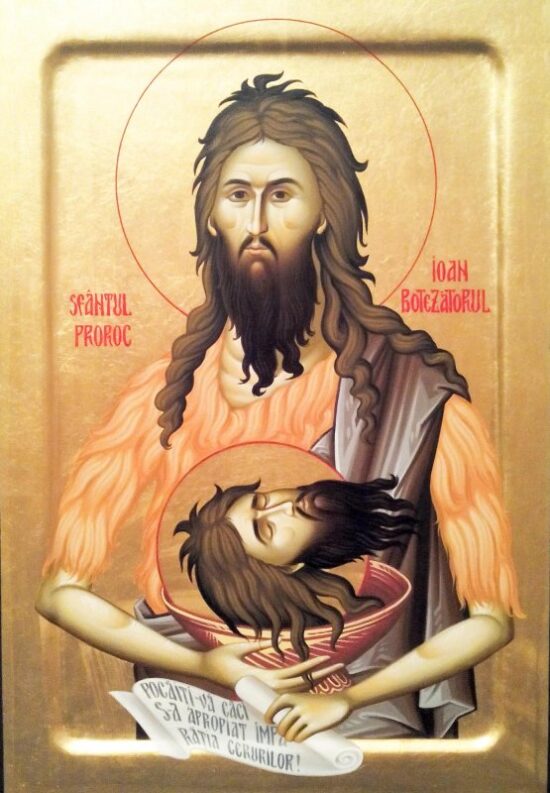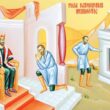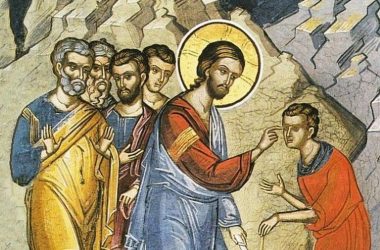The last feast of August and of the ecclesiastic year, The beheading of Saint John the Baptist calls us to introspection and fasting no matter on what day of the week it occurs. Of course that fasting is not settled by the Church only as a sign of sadness for the killing of the Forerunner of the Lord, but also to remind us that the lack of repentance and refrainment may cause abominable deeds not only at personal level, but at social level as well.
Reading the tragic account of the earthly end of the one who prepared the path of the Lord, preaching repentance as a main preparation and condition for access in the Kingdom of heaven, we feel somehow detached of the events which took place, at most we have a feeling of revolt against the abominable crime and against those who caused it. This state should not give us not even the least spiritual comfort because we too every time we take off the sober coat of repentance or we give ourselves up to all kinds of pleasures and gluttony, we become some sort of Herods and Herodiads and Salomes.
`Repent ye, for the kingdom of heaven is at hand.` (Mathew 3, 2) represents the beginning of the sermon of the Baptist of the Lord but also of Christ the Savior showing by this that repentance is the main virtue of the Christian, it is the key which open the door towards the Kingdom of God. We especially read or hear speeches about repentance during the fast periods but if we take into account the words of Saint Simeon the New Theologian we should start every day of our ephemeral earthly life with this pure thought and wish: `Who after Baptism soiled himself through bad deeds and wrongdoings turning foolishly the temple of his body, the house of God, in a house of pleasures, passions and demons, that one needs repentance to return to the divine worthiness he had lost.
Therefore the role of repentance after Baptism is to turn back the Christian from the sins and passions in which he fell or fell again and to purify him and clad him in the gifts from the beginning of the Christian life.
By repentance the man doesn`t receive again the gifts he got at his Baptism, as they had not been wasted just buried in the soil of his soul. By a repentance full of tears the man like some rain clouds gives water to his soul for taking to surface from the depth the fruit received through the mystery of the Holy Baptism and for making it alive in order to gain salvation.
Repentance being the essential condition for the salvation of the man fallen into sins after Baptism, according to the Holy Fathers, it is the first and greatest spiritual work, above all virtues and the man must dedicate himself to it completely, above all things, as in it is included all his part of toil he has to fulfill for being saved.
Being asked by a disciple what he had to do for his salvation Saint Pimen answered:
`When God rebukes us what should we fear?`
The brother answered: `We should fear our own sins.
Thus the elder told him: `let us enter our cell and remember our sins and God will help us in everything.`
The fathers from Philocaly try their best to convince us that repentance is the greatest, the highest of all virtues. Didn`t they know that love is the highest? Of course theyh didn`t ignore this one but they insisted to warn us that the virtue of love is higher than repentance but our earthly condition doesn`t allow us to reach love in all its purity and fullness or any other virtue.
Looking critically at our spiritual state we realize that love or any other virtue we have didn`t reach any peak. This fact creates a discontent towards what we did, which is the essence of repentance. Repentance is the hypostasis of judge of our conscience not only for our sins, but also for our virtues, as we always fulfill them incompletely. It doesn`t neglect anything, it doesn`t excuse anything, it doesn`t cover anything. Therefore any sin, any incomplete virtue are subject to our inner judgment or repentance. In this respect the Holy Fathers gave to repentance the status of peak of virtues, the support and the companion of all the other Christian virtues. It is their mother, their foundation and their root but also their sister which helps them grow and fulfill. The spiritual development of the man relies on the points of resistance of repentance. The awareness of our imperfections and sins maintains our spiritual liveliness aiming on a higher spiritual life.
Repentance is also a deep and vivid inner feeling by which the man expresses all of his sins or more generally his sinful state and gives up on it and asks for forgiveness from God, calling him to his help for not sinning anymore in the future.
The beginning of repentance is the confession of the sins as the confession of the sins is the indispensible condition for giving up on them.
Confessing his sins by repentance the man asks for forgiveness from God expressing his wish to unite with Him. Far from being only a mere observation of the sin, repentance manifests itself as an overcoming of it. Through it the man rejects his sinful past and aims with all his might to reach those which are before him, to reach the measure of the new and flawless man to which he was called by creation.
Thinking and working in this way let us follow on every day of our life the virtue of repentance, asking Saint John the Baptist, the teacher of repentance to strengthen us in fulfilling this virtue, being the only way to correct and regenerate our life, of elevation and release from a sinful and burdensome past, acquiring good hopes for salvation.
Archimandrite Mihail Daniliuc
Source: http://ziarullumina.ro






